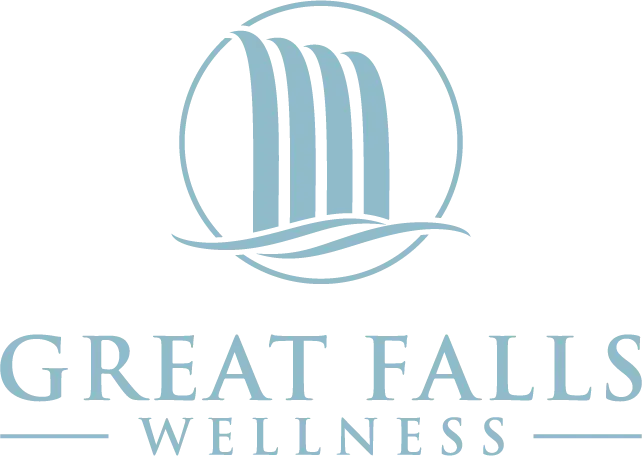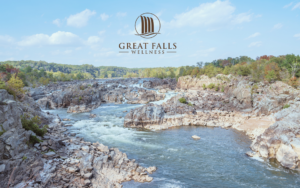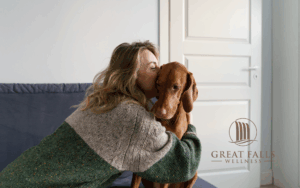Addiction can steal joy, purpose, and connection. Many people try office-based counseling yet still feel stuck. Great Falls Wellness in Northern Virginia changes the scenery by offering equine therapy for drug addiction as a central part of our outpatient program. Working with a living, breathing partner on four sturdy legs brings recovery lessons to life in ways a worksheet never can.
Why Horses?
Horses are sensitive herd animals that notice every gesture. When you fidget, they step away; when you breathe slowly, they soften. That immediate feedback helps clients see how thoughts and emotions ripple outward. The rhythm of brushing, leading, or simply standing beside a thousand-pound animal also grounds the nervous system. Clients often report calmer heart rates and clearer thinking after a morning in the paddock.
Research Backs the Barn
A Norwegian study published through the National Institutes of Health explored horse-assisted therapy for substance-use disorders. The authors observed that “The stable environment is portrayed as a context where participants could construct a positive self: one which is useful, responsible, and accepted; more fundamentally, a different self from the ‘patient/self’ receiving treatment for a problem.” (https://pmc.ncbi.nlm.nih.gov/articles/PMC5054942/). Their findings align with what our clients describe after only a few weeks on the farm.
Equine Therapy for Drug Addiction in the Outpatient Setting
Great Falls Wellness proves that experiential treatment does not require a month away at a ranch. Clients attend two or three farm visits each week while still sleeping at home, working, and caring for family. Because we partner with a nearby private facility, travel time from our Great Falls office is under fifteen minutes. Evening and weekend slots make participation practical for commuters from Reston, Loudoun County, McLean, and Potomac, Maryland. These flexible sessions show how equine therapy for drug addiction can fit modern life without sacrificing evidence-based care.
Therapeutic Goals
- Regulation
Handling a powerful animal requires calm breathing, steady posture, and focused attention. Those skills transfer directly to moments when cravings strike at home or work. - Identity Repair
Addiction often leaves people feeling like failures. During equine therapy for drug addiction, clients are partners, not patients. Completing a new task—such as gaining a horse’s trust—rebuilds self-esteem piece by piece. - Social Skill Building
Horses react to tone, distance, and intention. Reading those cues trains the same nonverbal awareness needed for healthy human relationships. - Motivation
Routine clinic visits can blur together. An outdoor session adds variety, excitement, and something positive to anticipate each week, keeping engagement high.
Who Thrives With This Approach?
Equine work benefits people who feel disconnected from their bodies, veterans managing trauma, teens and young adults who prefer action over talk, and anyone who learns best by doing. Our intake team screens for allergies, severe phobias, or medical conditions that might require modifications.
Safety and Ethical Care
Our horses are seasoned therapy partners selected for calm dispositions. They receive regular veterinary checks, balanced diets, and scheduled rest days. Helmets, closed-toe shoes, and safety briefings are mandatory. If a client cannot safely enter the arena, we offer alternative activities such as preparing feed or observing herd behavior from the fence line.
Brain and Body Science
Research on animal-assisted interventions shows measurable biological shifts. Gentle contact with horses can lower cortisol, the body’s main stress hormone, and boost oxytocin, the bonding chemical linked to feelings of trust. Functional imaging studies suggest that experiential therapies activate reward pathways without drugs, offering a healthier source of dopamine. Because relapse risk rises when reward circuits stay under-stimulated, adding an enjoyable activity like horsemanship can strengthen overall treatment impact.
Family Involvement
Addiction tears at family ties. Great Falls Wellness invites loved ones to observe certain equine sessions and join debrief groups. Watching a parent guide a horse calmly or seeing a sibling laugh while grooming can replace painful memories with hopeful ones. Families practice supportive language, clear boundaries, and shared celebration of progress.
Roots in Northern Virginia’s Equestrian Culture
Loudoun and Fairfax counties host some of the nation’s oldest horse farms. That heritage gives our program unique strength. We collaborate with seasoned trainers who understand both horsemanship and behavioral health. Spacious indoor arenas ensure year-round access, so progress never stalls due to bad weather.
Cost and Insurance
Many commercial plans classify our service under experiential or recreational therapy. We help clients submit documentation and appeal denials when needed. Sliding-scale options and payment plans keep the barn door open to motivated individuals regardless of financial status.
Measuring Progress
We track attendance, urinalysis results, self-reported craving scales, and clinician-rated anxiety scores. Preliminary data from the past year show a 40 percent drop in weekly cravings after six equine sessions. While numbers matter, the brightest indicator often appears when a client walks into group therapy with hay on their boots and a genuine smile.
Complementing Traditional Treatment
Equine sessions sit alongside cognitive-behavioral therapy, medication management, family counseling, and relapse-prevention planning. This layered care addresses mind, body, relationships, and community—four pillars of sustainable sobriety.
Conclusion
Horses teach without speaking. They reward patience, honesty, and calm leadership—the same qualities that support lasting sobriety. Through equine therapy for drug addiction, Great Falls Wellness delivers those lessons to people who need recovery to feel real, not theoretical. Change is possible. If you or a loved one needs equine therapy for drug addiction in a program that respects work, school, and family life, call Great Falls Wellness today. One meeting in the paddock could become the first step toward a healthier, happier life.
Sources
Kern-Godal, A., Brenna, I. H., Arnevik, E. A., & Ravndal, E. (2016). More Than Just a Break from Treatment: How Substance Use Disorder Patients Experience the Stable Environment in Horse-Assisted Therapy. Substance abuse : research and treatment, 10, 99–108. https://doi.org/10.4137/SART.S40475



